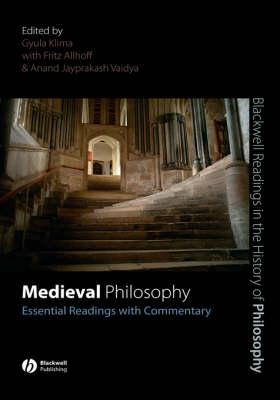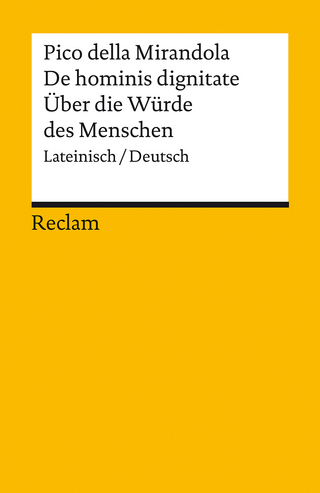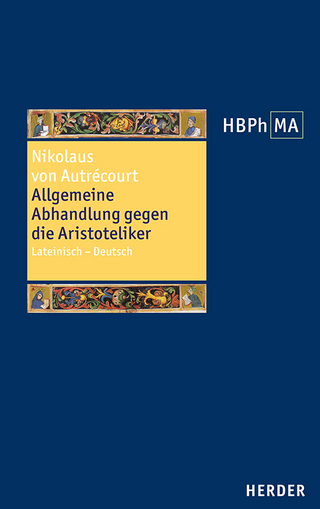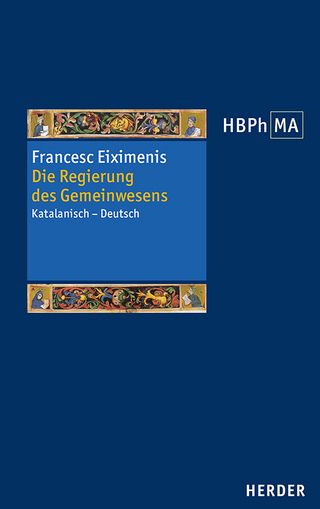
Medieval Philosophy
Wiley-Blackwell (Verlag)
978-1-4051-3564-1 (ISBN)
This collection of readings with extensive editorial commentary brings together key texts of the most influential philosophers of the medieval era to provide a comprehensive introduction for students of philosophy.
Features the writings of Augustine, Thomas Aquinas, Boethius, John Duns Scotus and other leading medieval thinkers
Features several new translations of key thinkers of the medieval era, including John Buridan and Averroes
Readings are accompanied by expert commentary from the editors, who are leading scholars in the field
Gyula Klima is a professor of philosophy at Fordham University. He acts as director of the international Society of Medieval Logic and Metaphysics and an executive council member of the American Catholic Philosophical Association since 2003. Klima is the author of ARS ARTIUM: Essays in Philosophical Semantics, Medieval and Modern (1988) and John Buridan: Summulae de Dialectica (2001). Fritz Allhoff is Assistant Professor of Philosophy at Western Michigan University. He has published work in journals including American Journal of Bioethics, History and Philosophy of the Life Sciences, International Journal of Applied Philosophy, and Kennedy Institute of Ethics Journal. Anand Jayprakash Vaidya is Assistant Professor of Philosophy at San José State University. His research is in Metaphysics & Epistemology, and Philosophy of Mind.
Text Sources and Credits. Acknowledgments.
General Introduction.
Part I: Logic and Epistemology.
Introduction.
Philosophy, Theology, Logic, and the Sciences.
1. Augustine on Ancient Philosophy.
2. Dialectica Monacensis (anonymous, twelfth century) on the Division of Science.
3. Thomas Aquinas on the Nature and Scope of Sacred Doctrine.
The Problem of Universals.
4. Boethius Against Real Universals.
5. John of Salisbury on the Controversy over Universals.
6. The Summa Lamberti on the Properties of Terms.
7. William Ockham on Universals.
8. John Buridan on the Predicables.
Illumination vs. Abstraction, and Scientific Knowledge.
9. Augustine on Divine Ideas and Illumination.
10. Thomas Aquinas on Illumination vs. Abstraction.
11. Thomas Aquinas on our Knowledge of the First Principles of Demonstration.
12. Henry of Ghent on Divine Illumination.
13. Duns Scotus on Divine Illumination.
Knowledge and Skepticism.
14. Augustine on the Certainty of Self-Knowledge.
15. Thomas Aquinas on whether the Intellect Can Be False.
16. Henry of Ghent on whether a Human Being Can Know Anything.
17. Nicholas of Autrecourt on Skepticism about Substance and Causality.
18. John Buridan on Scientific Knowledge.
Part II: Philosophy Of Nature, Philosophy of the Soul, Metaphysics.
Introduction.
Hylomorphism, Causality, Natural Philosophy.
19. Thomas Aquinas on the Principles of Nature.
20. Thomas Aquinas on the Mixture of Elements.
21. Giles of Rome on the Errors of the Philosophers.
22. Selections from the Condemnation of 1277.
23. John Buridan and the Impetus Theory of Projectile Motion.
Human Nature and the Philosophy of the Soul.
24. Augustine on the Soul.
25. Averroës on the Immateriality of the Intellect.
26. Siger of Brabant on the Intellective Soul.
27. Thomas Aquinas on the Nature and Powers of the Human Soul.
28. John Buridan on the Immateriality of the Soul.
Metaphysics, Existence, and Essence.
29. Avicenna on Common Nature.
30. Thomas Aquinas on Being and Essence.
31. John Buridan on Essence and Existence.
God’s Existence and Essence.
32. Augustine on Divine Immutability.
33. Anselm of Canterbury on God’s Existence.
34. Thomas Aquinas on God’s Existence and Simplicity.
PART III: PRACTICAL PHILOSOPHY.
Introduction.
Goodness and Being.
35. Augustine on Evil as the Privation of Goodness.
36. Augustine on the Origin of Moral Evil.
37. Boethius on Being and Goodness.
38. Thomas Aquinas on the Convertibility of Being and Goodness.
Freedom of the Will.
39. Augustine on the “Divided Will”.
40. Boethius on Divine Providence and the Freedom of the Will.
41. Anselm of Canterbury on Free Will.
42. Henry of Ghent on the Primacy of the Will.
Virtues and Happiness.
43. Boethius of Dacia on the Supreme Good.
44. Thomas Aquinas on Happiness.
Divine Law, Natural Law, Positive Law.
45. Thomas Aquinas on Natural Law and Positive Law.
46. John Duns Scotus on Natural Law and Divine Law.
Suggestions for Further Reading.
Index
| Erscheint lt. Verlag | 12.6.2007 |
|---|---|
| Reihe/Serie | Blackwell Readings in the History of Philosophy |
| Verlagsort | Hoboken |
| Sprache | englisch |
| Maße | 183 x 254 mm |
| Gewicht | 853 g |
| Themenwelt | Geisteswissenschaften ► Philosophie ► Philosophie des Mittelalters |
| ISBN-10 | 1-4051-3564-6 / 1405135646 |
| ISBN-13 | 978-1-4051-3564-1 / 9781405135641 |
| Zustand | Neuware |
| Haben Sie eine Frage zum Produkt? |
aus dem Bereich


